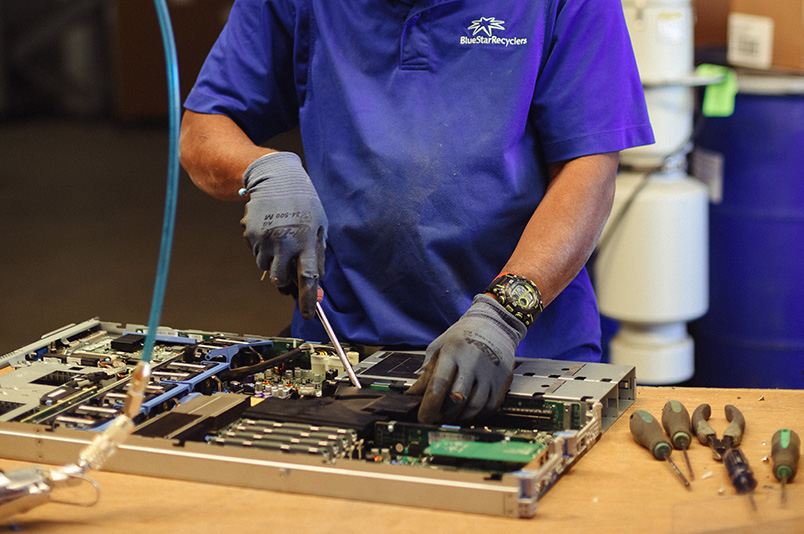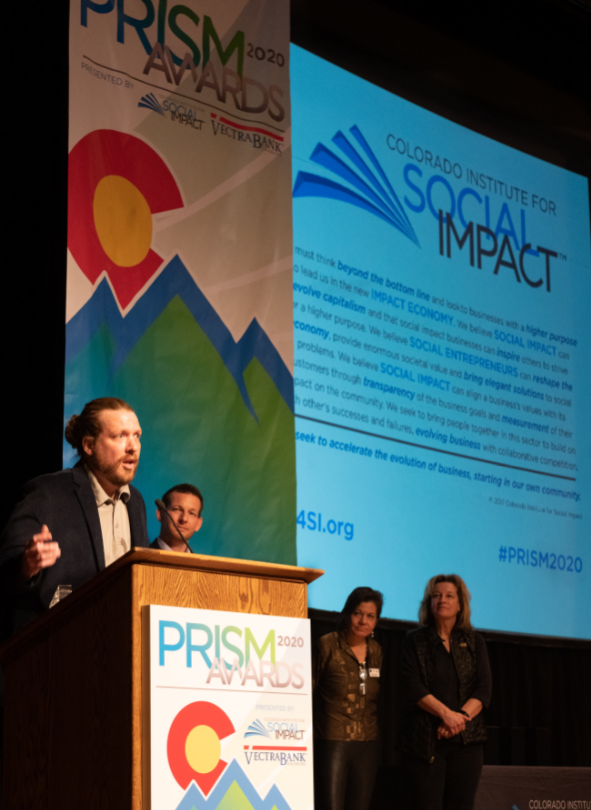What is Social Impact?
Social Impact is the outcome of a mission-driven business or a business with a higher purpose that uses the economic engine of capitalism for good.
What is a Social Impact business?
A Social Impact business is a business that exists to solve a social issue or a business that considers commercial and social goals equally to businesses that have a clearly stated higher purpose with a culture built around it.
Hover or tap anywhere on our NI4SI Model to learn more and see examples of each business type within the continuum.
NONPROFIT/ CHARITY
NONPROFIT/ CHARITY
Social
Enterprise
Social Enterprise
Social
Business
Social Business
Conscious Captialism
Conscious Captialism
Public Benefit Corporation
Public Benefit Corporation
FOR PROFIT COMPANY
For Profit Company
Some of our favorite books on Social Impact
Start with Why – “In 2009, Simon Sinek started a movement to help people become more inspired at work, and in turn inspire their colleagues and customers. Since then, millions have been touched by the power of his ideas, including more than 28 million who’ve watched his TED Talk based on START WITH WHY — the third most popular TED video of all time.
Sinek starts with a fundamental question: Why are some people and organizations more innovative, more influential, and more profitable than others? Why do some command greater loyalty from customers and employees alike? Even among the successful, why are so few able to repeat their success over and over?
START WITH WHY shows that the leaders who’ve had the greatest influence in the world all think, act, and communicate the same way — and it’s the opposite of what everyone else does. Sinek calls this powerful idea The Golden Circle, and it provides a framework upon which organizations can be built, movements can be led, and people can be inspired. And it all starts with WHY.”
The Infinite Game – “How do we win a game that has no end? Finite games, like football or chess, have known players, fixed rules, and a clear endpoint. The winners and losers are easily identified. Infinite games, games with no finish line, like business or politics, or life itself, have players who come and go. The rules of an infinite game are changeable, while infinite games have no defined endpoint. There are no winners or losers – only ahead and behind.
The question is, how do we play to succeed in the game we’re in?
In this revelatory book, Simon Sinek offers a framework for leading with an infinite mindset. On one hand, none of us can resist the fleeting thrills of a promotion earned or a tournament won, yet these rewards fade quickly. In pursuit of a just cause, we will commit to a vision of a future world so appealing that we will build it week after week, month after month, year after year. Although we do not know the exact form this world will take, working toward it gives our work and our life meaning.”
The Business of Good narrates the story behind social entrepreneurship as told by the individuals compelled to create a change in the world–not just another business. Serial and social entrepreneur Jason Haber intertwines case studies and anecdotes that show how social entrepreneurship is creating jobs, growing the economy, and ultimately changing the world.
From Main Street to Wall Street, today’s social entrepreneurs are rebooting capitalism, challenging the charity industrial complex, and disrupting business models. Haber envelops the reader in the foundation of social entrepreneurship, from Benjamin Franklin to what he calls The Great Convergence, the turn-of-the-millennium zeitgeist shift which provided the fuel for social entrepreneurship’s surge to the forefront of business.
The Purpose Economy – In 2014 Aaron Hurst, Ashoka fellow and founder of Imperative and Taproot Foundation, published The Purpose Economy, the book that catalyzed the purpose revolution. With his prediction that purpose was the next major economic era, many are now racing to find answers and direction toward discovering their personal, professional, and organizational purpose. Leaders from around the world have embraced Hurst’s work and have asked for more.
Based on interviews with hundreds of entrepreneurs, a new survey of over 100,000 people and refined societal trends, Hurst shows that this new era is fueling demand for purpose-centered professionals who not only create more satisfying careers, but also contribute more productively to teams and organizations.
A new view of success based on relationships, impact, and growth is spreading across the globe, and individuals and organizations that embrace that view have emerged as the leaders of the new economy.
Mission, Inc. – “In this groundbreaking guide, social entrepreneurs Kevin Lynch and Julius Walls draw on their own extensive experiences and those of twenty other social enterprise leaders to focus on the fundamental blocking and tackling tactics that make the difference between success and failure. Exploring the many paradoxes that can hamstring social enterprises, the authors explain how starting and running a social enterprise requires leaders to adopt an entirely different mindset and often a wholly different perspective on the day-to-day choices they’re forced to make.”
How to Change the World provides vivid profiles of those social entrepreneurs that are pioneering problem-solving models that will reshape the 21st century…Now published in more than twenty countries, David Bornstein’s How to Change the World has become the bible for social entrepreneurship–in which men and women around the world are finding innovative solutions to a wide variety of social and economic problems.”
Tattoos on the Heart – “For twenty years, Father Gregory Boyle has run Homeboy Industries, a gang-intervention program located in the Boyle Heights neighborhood of Los Angeles—also known as the gang capital of the world. In Tattoos on the Heart, he has distilled his experience working in the ghetto into a breathtaking series of parables inspired by faith…This is a motivating look at how to stay faithful in spite of failure, how to meet the world with a loving heart, and how to conquer shame with boundless, restorative love.”
“51 Questions on Social Entrepreneurship is an engaging, informative, fun book on how to create social impact. It is told in story and Q&A format through the lens of three hopeful social entrepreneurs launching their first social enterprise. Join them on their adventure and learn about key topics in social entrepreneurship including legal structures, business models, impact measurement, and the why behind the growing movement to create social impact through business…”
Start Something That Matters – “The incredible story of the man behind TOMS Shoes and One for One, the revolutionary business model that marries fun, profit, and social good”
“Why this book is for you:
- You’re ready to make a difference in the world—through your own start-up business, a nonprofit organization, or a new project that you create within your current job.
- You want to love your work, work for what you love, and have a positive impact on the world—all at the same time.
- You’re inspired by charity: water, method, and FEED Projects and want to learn how these organizations got their start.
- You’re curious about how someone who never made a pair of shoes, attended fashion school, or worked in retail created one of the fastest-growing footwear companies in the world by giving shoes away.
- You’re looking for a new model of success to share with your children, students, co-workers, and members of your community.
You’re ready to start something that matters.”
In The Social Entrepreneur’s Handbook, Scofield leads you through the entire process of starting up and running a nonprofit, sharing personal success stories and advice on what not to do–valuable lessons he learned the hard way. The process, while risky, isn’t as difficult as you might think. Practically speaking, you need only two things: an idea and a plan. The former comes from you and you alone. This book supplies the latter.”
Profit & Purpose – “Based on in-depth interviews with founders, Profit & Purpose profiles a number of the most successful pioneers of this new way forward, telling the stories of thirteen social enterprises ranging from non-profits like Charity: Water and Donors Choose.org, to for-profits, like Method and Burts Bees; from startups like Etsy and Warby Parker, to multinational corporations with market capitalizations in the hundreds of billions, like Coca-Cola, IBM and Nike. Kyle Westaway digs beneath the public stories of these organizations’ success to reveal how they have harness the power of purpose.”
How to be a Social Entrepreneur Make Money and Change the World – “As a social entrepreneur, you can build a business that changes the world. But you will face some unique challenges. This book will prepare you for them.
Packed with advice, inspiration and real–life stories, it will help you:
- Define what you want to do and why you want to do it
- Find the right kind of funding
- Build a brand that makes you unique
- Find a team as motivated and inspired as you are
- Measure the impact you′re havingHow to be a Social Entrepreneur is the only social enterprise start–up guide you′ll ever need.”
Building Social Business – Muhammad Yunus, the practical visionary who pioneered microcredit and, with his Grameen Bank, won the 2006 Nobel Peace Prize, has developed a new dimension for capitalism which he calls “social business.” The social business model has been adopted by corporations, entrepreneurs, and social activists across the globe. Its goal is to create self-supporting, viable commercial enterprises that generate economic growth as they produce goods and services to fulfill human needs. In Building Social Business, Yunus shows how social business can be put into practice and explains why it holds the potential to redeem the failed promise of free-market enterprise.”
Conscious Capitalism – At once a bold defense and reimagining of capitalism and a blueprint for a new system for doing business, “Conscious Capitalism” is for anyone hoping to build a more cooperative, humane, and positive future. Whole Foods Market cofounder John Mackey and professor and Conscious Capitalism, Inc. cofounder Raj Sisodia argue that both business and capitalism are inherently good, and they use some of today’s best-known and most successful companies to illustrate their point. Read this book and you’ll better understand how four specific tenets–higher purpose, stakeholder integration, conscious leadership, and conscious culture and management–can help build strong businesses, move capitalism closer to its highest potential, and foster a more positive environment for all of us.
Conscious Leadership – “John Mackey started a movement when he founded Whole Foods, bringing natural, organic food to the masses and not only changing the market, but breaking the mold. Now, for the first time, Conscious Leadership closely explores the vision, virtues, and mindset that have informed Mackey’s own leadership journey, providing a roadmap for innovative, value-based leadership—in business and in society.”
Conscious Leadership demystifies strategies that have helped Mackey shepherd Whole Foods through four decades of incredible growth and innovation, including its recent sale to Amazon. Each chapter will challenge you to rethink conventional business wisdom through anecdotes, case studies, profiles of conscious leaders, and innovative techniques for self-development, culminating in an empowering call to action for entrepreneurs and trailblazers—to step up as leaders who see beyond the bottom line.
The B Corp Handbook – “Build a Better Business with interviews, tips, and best practices from over 100 B Corporations. Author, B Corp owner and sustainability consultant Ryan Honeyman shows that using business as a force for good can help you attract and retain the best talent, distinguish your company in a crowded market, and increase customer trust, loyalty, and evangelism for your brand.”
Let My People Go Surfing – “In his long-awaited memoir, Yvon Chouinard-legendary climber, businessman, environmentalist, and founder of Patagonia, Inc.-shares the persistence and courage that have gone into being head of one of the most respected and environmentally responsible companies on earth. From his youth as the son of a French Canadian blacksmith to the thrilling, ambitious climbing expeditions that inspired his innovative designs for the sport’s equipment, Let My People Go Surfing is the story of a man who brought doing good and having grand adventures into the heart of his business life-a book that will deeply affect entrepreneurs and outdoor enthusiasts alike.”
“In The Responsible Company, published by Patagonia, Yvon Chouinard, founder and owner of Patagonia, and Vincent Stanley, co-editor of its Footprint Chronicles, draw on their 40 years’ experience at Patagonia – and knowledge of current efforts by other companies – to articulate the elements of responsible business for our time.”
Good Business– From his humble beginnings selling soap in a sales training program to his rapid rise in the fast-paced New York advertising scene, Bill Novelli was well on his way to becoming a leader in the hypercompetitive business world. But it wasn’t long before he became disillusioned with the drive for profits at any cost. He knew that his marketing skills made those companies successful, but what good did that success do for the world? That question sent him on a career path that involved taking the marketing and communication tactics long used by big businesses and applying them to social change. He found that this strategy was not only good for the world but also good for business.
In Good Business, Novelli begins with his early career success in Mad Men–era marketing, which left him feeling unfulfilled. He describes the process of changing career trajectory: how he helped reposition the Peace Corps; built Porter Novelli, a global PR agency for social impact; fought the Tobacco Wars; and became CEO of AARP, the largest nonprofit in America. Drawing practical lessons and principles from play-by-play stories of his experiences in large and small organizations, Novelli deploys his characteristic wit to stress the importance of building and maintaining connections with people―and engaging them in the cause.
People Over Profit – “Sevenly founder Dale Partridge uncovers the seven core beliefs shared by consumers, starters, and leaders behind this transformation. These beliefs have enabled Dale to build a multimillion-dollar company that is revolutionizing the marketplace. He believes they are the secret to creating a sustainable world that values honesty over deception, transparency over secrecy, authenticity over hype, and ultimately, people over profit.”
“…In Give and Take, Adam Grant, an award-winning researcher and Wharton’s highest-rated professor, examines the surprising forces that shape why some people rise to the top of the success ladder while others sink to the bottom. Praised by social scientists, business theorists, and corporate leaders, Give and Take opens up an approach to work, interactions, and productivity that is nothing short of revolutionary.”
“The Method Method is an irreverent, candid, firsthand case study. Readers will learn how today’s consumers behave, how today’s companies compete, and how both groups are acting together to drive profound global change.”
Mission in a Bottle – “In an incredibly fun and accessible two-color graphic-book format, the cofounders of Honest Tea tell the engaging story of how they created and built a mission-driven business, offering a wealth of insights and advice to entrepreneurs, would-be entrepreneurs, and millions of Honest Tea drinkers about the challenges and hurdles of creating a successful business–and the importance of perseverance and creative problem-solving.”
Firms of Endearment – “… From retail to finance and industries in between, the organizations who recognize that doing good is good business are becoming the ultimate value creators. They’re changing their culture and generating every form of value that matters: emotional, experiential, social, and financial. And they’re doing it for all their stakeholders. Not because it’s simply politically correct, because it’s the only path to long-term competitive advantage. These are the firms of endearment. Companies people love doing business with, working for and collaborating with as partners. Since the publication of the First Edition, the concept of corporate social responsibility has become embraced as a valid, important, and profitable business model. It is a trend that has transformed the workplace and corporate world. This Second Edition updates the examples, cases, and applications from the original edition, giving readers insight into how this hallmark of the modern organization is practiced today.”
Ben & Jerry’s: The Inside Scoop – “The former CEO of Ben & Jerry’s tells how two ’60s holdovers built a single ice cream store into one of America’s hottest companies. “Deftly and compassionately captures [Ben’s] genius in all its entrepreneurial splendor…This tale will keep you entertained.”–New York Times Book Review.”
“…The Responsibility Revolution reveals the smartest ways for companies to build a better future-and hold themselves accountable for the results. Thousands of companies have pledged to act responsibly; very few have proven that they know how. This book will guide them. The Responsibility Revolution presents fresh ideas and actionable strategies to commit your company to a genuine socially and environmentally responsible business and culture, one that not only competes but wins on values.”
“In Uncontainable, Tindell reveals his approach for building a business where everyone associated with it thrives through embodying the tenets of Conscious Capitalism. Tindell’s seven Foundation Principles are the roadmap that drives everyone at The Container Store to achieve the goals of the company. Uncontainable shows how other businesses can adapt this approach toward what Tindell calls the most profitable, sustainable and fun way of doing business. Tindell is that rare CEO who fully embraces the “Golden Rule” of business – where all stakeholders – employees, customers, vendors, shareholder, the community – are successful through a harmonic balance of win-wins.”
Public Benefit Corporation - LOCAL EXAMPLE
Helping Habit
Helping Habit is an engagement platform for nonprofit organizations, volunteer/donors, and corporations. We help nonprofit organizations operate more efficiently, increase their donations, lower their expenses, and reach a new audience by providing them free state-of-the-art software tools that they would otherwise have to pay high fees to have.
We help expand volunteerism by providing volunteers and donors with a marketplace of nonprofit causes to explore and easily connect with based on their interests, schedule, and location.
We help corporations do more good by providing them with a system to manage and track their corporate social responsibility programs and by connecting them with nonprofits they may not have otherwise known about.
Our business model shifts the cost burden of software for nonprofits from the organizations to the individuals and corporations looking to interact with them. As a Colorado public benefit corporation and award-winning B Corp, our mission is to put opportunities for good at the fingertips of every person and in doing so, help nonprofit organizations accomplish and expand their goals.

Social Impact
Capitalism is a fundamentally human endeavor. Conscious Capitalism is the integration of beliefs in pro-capitalism & systems improvement, personal & business advancement, and social & environmental impact. When we operate with higher purpose, stakeholder orientation, conscious leadership, and conscious culture, we elevate humanity through business.
This year, almost 1/3 of respondents started or deepened consumer relationships with companies based on their response to the COVID-19 crisis.


Gen Z...
- Believes responsibility is primarily about being a good employer (97%) while also making products that are good for individuals and their families (95%)
- Wants companies to help people and the environment (91%) while donating to causes in their communities
85% of business leaders
The rise of the 4th sector
The world is changing at a rapid pace due to innovation, technology and a new generation of consumers. In addition to price and quality, more and more consumers want to know where their products are sourced, how their purchase will impact their local economy, and how to best support businesses that are doing more to support their community.


